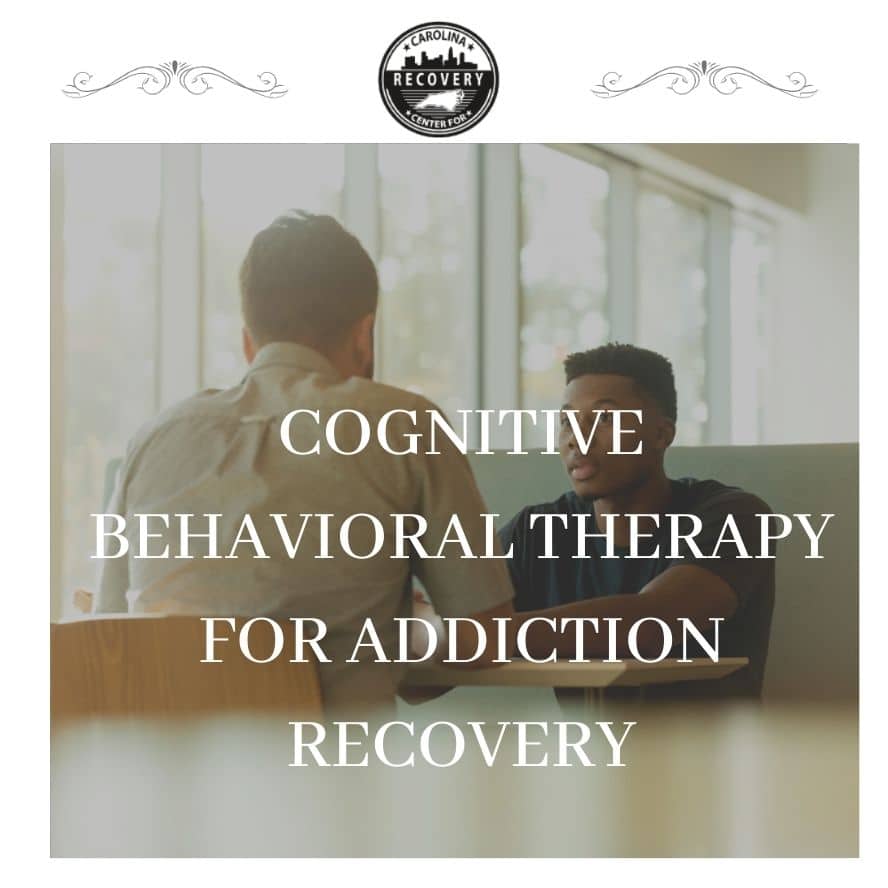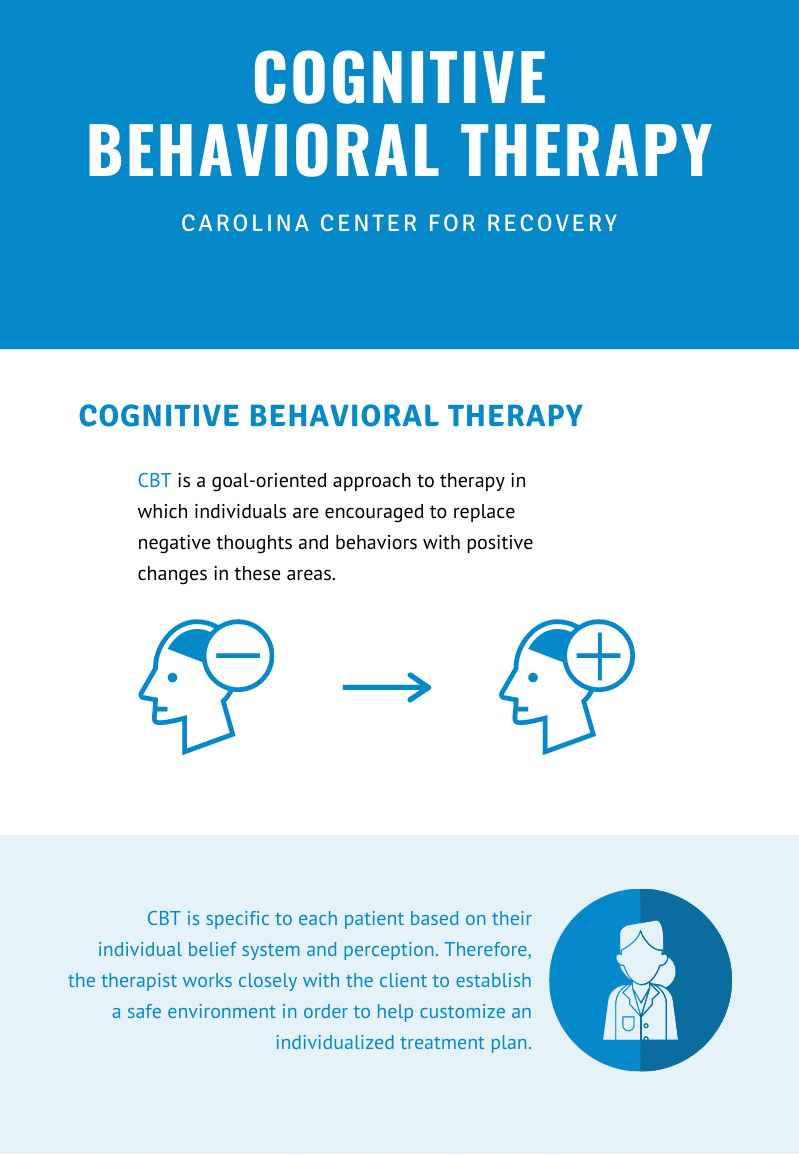Cognitive Behavioral Therapy for Addiction Recovery

Medically Verified: 2/1/24
Medical Reviewer
Chief Editor

All of the information on this page has been reviewed and verified by a certified addiction professional.
With so many options for substance abuse treatment, it is often difficult for individuals to find the best option that caters to their unique needs. There are various approaches to detox, treatment, and even therapy. Since it is common for individuals struggling with substance abuse to engage in destructive, negative thinking, and behaving, cognitive behavioral therapy (CBT) is a popular therapy used in addiction treatment programs in North Carolina.
More often than not, addicted individuals are oblivious to negative thought patterns and seek treatment to appease friends and family or to treat depression. However, cognition affects your entire wellbeing. Therefore, cognitive behavioral therapy is one of the most beneficial therapeutic approaches to addiction recovery.
What is Cognitive Behavioral Therapy?
Developed as a way to prevent addiction relapse in the 1960s, cognitive behavioral therapy was developed by Dr. Aaron T. Beck. Initially, CBT was used as a therapy to help struggling alcoholics and later became a practice used with individuals addicted to drugs as well. Cognitive-behavioral therapy was not only used for the treatment of substance abuse but also for mental health disorders such as anxiety and depression.

Unlike most talk therapies, cognitive behavioral therapy involves skill-building and even homework assignments to complete before the next session. In other words, the therapist acts much like a teacher for addiction recovery for the clients. Before CBT is effective, the therapist and client must form a trustworthy relationship filled with cooperation from both parties. The client must feel safe enough to provide feedback in order for the treatment plan to be adjusted properly.
How CBT Works in Addiction Therapy
The learning process behind the techniques implemented in cognitive behavioral therapy is an important component of unraveling the development of addiction. CBT teaches individuals how to identify and correct negative thought patterns and behaviors that often lead to addiction. Clients will also learn how to identify and address other mental health disorders and physical health issues as well. The goal of CBT is identifying behaviors, analyzing unhealthy reactions, and utilizing healthy coping skills.
Individuals struggling with addiction are prone to adapting harmful thinking patterns. More often than not, these individuals struggle with strong feelings of guilt, shame, hopelessness, and even failure. These negative thought patterns often propel the negative thoughts and behaviors associated with substance abuse. Once the individual goes through a professional addiction treatment or dual diagnosis program and begins cognitive behavioral therapy for substance abuse, he/she will begin to develop healthy ways to change negative thoughts and behaviors into positive ones.
CBT is a research-based treatment modality that is problem-focused and goal-directed which often provides the following benefits for individuals in addiction recovery:
- Helps clients explore unhealthy patterns of behaviors that lead to self-destructive behaviors
- Enables the therapist to educate the client on healthy, positive thought patterns and new coping skills
- Cultivates a strong foundation for the client and therapist to work together to actively seek alternative ways of dealing with stress, triggers, and other issues associated with addiction recovery
- Provided in the form of individual or group therapy
- Trained therapists often assign outside of session homework assignments for clients
- Incorporates useful and practical strategies that can help clients in their everyday lives.
CBT Techniques in Addiction Treatment
The goal of cognitive-behavioral therapy in addiction treatment is to help individuals gain a better understanding of his/her own thought processes. This specific approach gives individuals the opportunity to reflect on positive and negative feedback for various patterns of behavior. For example, an individual may explore whether they are less likely to relapse if they practice positive affirmations or self-criticism and perfectionism. The clients will often monitor their reactions after reviewing this method in different scenarios and decide which action works best for the individual.
- Exposure to Imagery – Imagery exposure allows clients to recount memories that arouse negative feelings. The client will provide sensory details such as what the surroundings looked like, smelled like, and even felt like. While revisiting the memories, each client will attempt to label what they through and felt, as well as any behavioral urges they may have experienced. The goal of this method is to help individuals identify painful memories in order to minimize self-criticism and other negative emotions.
- Pleasant Activity Planning – This CBT technique encourages clients to write out a schedule for the next 7 days. For each day, clients will plan out at least one self-care activity or social activity that they normally wouldn’t do. This is an extremely beneficial technique for individuals suffering from depression. Another suggestion is for clients to schedule an activity that requires a mastery or sense of accomplishment once the task is over.
- Exposure to Distressing Situations – Exposing clients to distressing situations during CBT involves the client making a list of things they would typically avoid. For each item, the client will rate the level of distress they would feel. The goal is to ease the stress associated with these triggers overtime to help the individual learn how to cope as they move onto the next item on the list.
Cognitive Behavioral Therapy in North Carolina
Overcoming substance abuse is very difficult, especially breaking the cycle of unhealthy thoughts and patterns of behavior. However, with the right professional guidance and sober support, individuals can work to end the cycle of addiction and maintain continuous sobriety.
At Carolina Center for Recovery, we believe addiction recovery is not a one-size-fits-all modality. Our compassionate staff understands the importance of taking a comprehensive approach to treating addiction which is why we offer cognitive behavioral therapy along with various other therapeutic options. The key to lifelong sobriety is personalized care that considers the individual needs of each client that walks through our door. If you or someone you love is struggling with addiction, call us today to learn about our substance abuse treatment programs in North Carolina.

